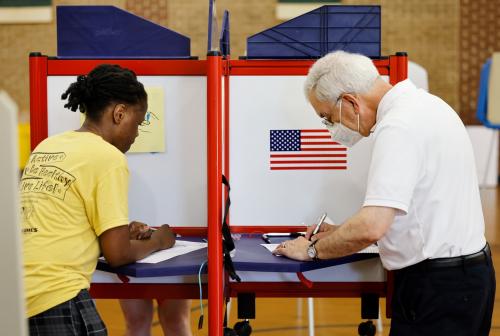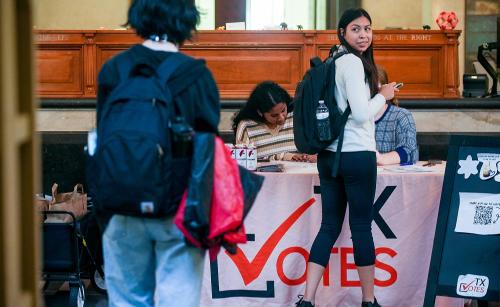This weekend, as part of an ongoing project on political parties and grassroots activism, I attended Netroots Nation, a progressive political action conference. I had the opportunity to sit down with one organization in attendance, Democracy for America (DFA). DFA is a progressive grassroots organization that describes itself as a “member driven, people-powered PAC.” I spoke with the organization’s chairman, Jim Dean (brother of 2004 presidential candidate and VT Governor, Howard Dean), and Charles Chamberlain, the organization’s executive director.
What are the benefits of Netroots Nation for an organization like yours or for progressives in general?
Jim Dean: For us—like everybody else—it’s a chance for everybody to get together and to communicate with each other, like we do throughout the year, but not face to face. For DFA, we’re involved in a lot of coalition work, and so that networking is really important not only for our partners but for finding other people.
We also have a scholarship program that we have been running, since about two or three years after it started. Several years ago we started sending anywhere from 30-40 people here. That’s really good for us to be part of because we actually get a lot smarter about what people are doing in their communities. I’ve often said our best ideas come from outside of the office—that’s not entirely true because we have some really smart people here (in our office)—what those folks are doing is really what matters. Netroots is really a paradigm of that. It really gets us into that in a big way.
Charles Chamberlain: Some of this event is about looking at what we’ve done and looking at best practices—what worked and what didn’t. Some of this event is about direct skills training. Some if this event is about planning for the future, and it’s about looking at what are the big issues coming up and where we’re going to be. It’s about discussions that lead to big picture and lead to small picture or sometimes both.
What are the biggest issues you’re going to be chasing in tougher races to get traction among voters?
CC: We know that income inequality is the biggest issue of our time. Economics matters. We need to rebuild our middle class. The difference between what a CEO makes and what a low-wage worker makes in this country is offensive. It’s not sustainable. The answer to the question of what are the issues that work, aren’t actually different in a blue state like Oregon or a red state like Texas or Kentucky.
The reality is, we polled expanding Social Security in Kentucky, and of course the majority of Democrats supported it. But so did the independents, and so did the majority of Republicans…in Kentucky. The majority of Republicans in Texas supported expanding Social Security. This is a winning path, and in fact, if Mary Landrieu or Mark Pryor loses, one of the reasons they lose is because they haven’t embraced expanding Social Security. If they would run on that issue, they would be attaching themselves to a very popular issue that would have a real impact on income inequality and make a real difference.
So, if you’re asking us what we’re pushing them to talk about? We’re pushing them to talk about raising the minimum wage; we’re pushing them to talk about expanding Social Security; we’re pushing them to talk about taking on student debt. All of these issues are issues that are universally supported not just by Democrats but by Republicans and Independents, and it’s the path to victory whether you’re in a red state or in a blue state.
What is a sleeper issue in 2014 that is flying under the radar?
CC: I’m willing to give you a sleeper issue that is hurting us. When we are looking at the immigration debate, I think the way we are currently enforcing deportations is really hurting our ability to strengthen and build our coalition on immigration reform. I think people in Washington are really underestimating how much our enforcement of deportation policies is hurting us.
Under this presidency, (President Obama) has deported more people than anyone else has before because we know how to govern—to a certain extent to his credit. The problem is it’s hurting us; it’s hurting our ability to actually reform immigration that needs to be done in the long run.
Many people are arguing that 2016 is probably going to be a good year for Democrats, whether it is based on who is up for reelection in the Senate or for the presidential race in general. How do you think Democrats, and progressives in particular, are best positioned to capitalize on that momentum and no squander it?
JD: The best thing we can do in 2016 is to do something good in 2014. We’re in about 60 campaigns right now, and we’re trying to take advantage to try to keep the Senate, which I think we’re going to do. We’re going to pick up a number of governorships—Pennsylvania and possibly Florida—and a bunch of state legislatures which we’re working very hard to do. So, I am confident we are not squandering opportunities we have right now, and I’m pretty confident we won’t squander opportunities we have in 2016. And the one wild card for me on this is not so much who is running for president. It’s that we are able to have an open and vigorous primary debate among a number of candidates. That will empower the voters to be in this.
If this is a coronation, that would be squandering an opportunity to me in 2016. If it is a vigorous and open debate, as I think it will be and it should be, I think we’re going to be ok.
Do you worry that candidates who are obviously not polling well might be scared off from challenging Secretary Clinton? Or do you think there are a lot of candidates out there who think ‘just because I’m polling at 7% doesn’t eliminate the need for an open debate’ and they’re willing to get out there?
JD: There are a lot of unknowns out there right now, in terms of who might be interested in running. We’ve all heard some of the names, but I don’t think that list is quite complete. As far as whether candidates are worried, I think you’ll see people step up to the plate. I think my brother (former presidential candidate Howard Dean) proved, you can do this race, you can get in there and you can get your (name) recognition up. And if you are bringing the issues up, you’re going to get some traction.
CC: I would add, though, that we absolutely need a real primary campaign with more than one or two people. But what I would say is that I think it would be extremely disappointing if we don’t have many candidates, and those many candidates need to include many women. Hillary is fantastic, but I want to choose between Hillary and others, whether that is Kirsten Gillibrand, Elizabeth Warren, Amy Klobuchar, or somebody else who hasn’t been mentioned yet.
What kinds of lessons have you learned from 2008 and what came to be the Obama presidency that informs your approach in 2016?
CC: One lesson that we learned: primaries matter. We had a 50 state primary; we had an actual intellectual conversation of ideas for a year—all the way to June until we learned who our nominee was. That was fantastic. It was not a disaster. Some of it was uncomfortable. Some of it wasn’t fun. But we are benefitted as a party when America is hearing us debate our ideas because our ideas are based in reality; they are based in where people are and what needs to happen as we move forward. What I can’t wait for is in this election, we’re going to have our debate of ideas while Republicans debate who is the most out-of-touch individual.
In the past, I’ve always said, “primaries matter,” but I’ve always put the caveat: “as long as they’re not a bloodbath.” Are you going to tell me the fight between Obama and Clinton (in 2008) wasn’t a bloodbath? That was a serious fight and there’s no question in my mind that it made whoever came out of that stronger.
JD: We have always been a coalition party; that’s our DNA; it’s in our DNA to do this. It’s not theirs (Republicans)—at least not since Ronald Reagan took office. The Democrats are a coalition party and we are much better at empowering than than disempowering. (Republicans) haven’t figured this out yet. And I’m not sure they will until they get a different breed of cat in there who is willing to run against their own party. They need a sort of combination of Edward Brooke and Teddy Roosevelt, and they don’t have that right now.



Commentary
Netroots 2014: A Conversation with Progressive Leaders
July 22, 2014